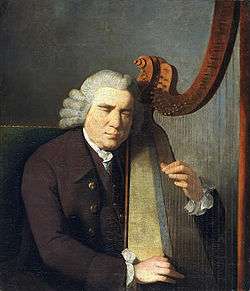1710 in Wales
This article is about the particular significance of the year 1710 to Wales and its people.
| |||||
| Centuries: |
| ||||
|---|---|---|---|---|---|
| Decades: |
| ||||
| See also: |
| ||||
Incumbents
- Prince of Wales - vacant
- Princess of Wales - vacant
Events
- 21 March – A verdict is given in the trial of High Church clergyman Henry Sacheverell, leading to riots breaking out in a number of places, including Wrexham, where a rabble breaks the windows of dissenters' homes and their meeting house.[1]
- 10 June – Watkin Williams-Wynn, heir to a baronetcy, establishes the "Cycle of the White Rose", a Jacobite group, in North Wales.[2]
- 30 September - John Ellis becomes Rector of Llandwrog and is made a canon of Bangor Cathedral.[3]
- October/November - In the 1710 British general election:
- John Meyrick becomes MP for Cardigan Boroughs.
- Sir Thomas Powell, 1st Baronet, becomes MP for Carmarthenshire.[4]
- Sir Edward Stradling, 5th Baronet, becomes MP for Cardiff.[5]
- exact dates unknown
- John Wynne obtains permission from the bishop's court to change the name of Trelawnyd to "Newmarket", in his quest to make it a centre of the lead industry.[6]
- A committee of the House of Commons declares Sir Humphrey Mackworth guilty of "many notorious and scandalous frauds". These included secretly diverting shares into his own account and using the proceeds to pay his own expenses.[7]
- A Visitation of the Archdeaconry of Carmarthen to Llandissilio finds that, out of about 120 families in the parish, 40 attend church at Easter, 20 at Whitsuntide and 20 at Christmas and notes that "the Minister suffers in his reputation for being addicted to drinking and swearing".[8]
- William Fleetwood, Bishop of St Asaph, encourages his clergy to preach in the Welsh language.[9]
Arts and literature
Births

John Parry, c.1710-1782
- 16 May - William Talbot, 1st Earl Talbot, politician (died 1782)
- 11 July - Sir John Morgan, 4th Baronet, politician (died 1767)[12]
- date unknown - James Thomas, Alderman and Portreeve of Swansea (died 1781)
- probable
- John Parry, harpist (died 1782)[13]
- Thomas Richards of Coychurch, lexicographer (died 1790)[14]
Deaths
- 1 January - William Lloyd, bishop of Norwich, 72[15]
- 17 February - George Bull, bishop of St David's, 75[16]
- April - Robert Morgan, Baptist minister, [17]
- 8 July - Robert Davies, scholar and son-in-law of Edward Vaughan of Trawsgoed, 52[18]
- 18 September - John Annesley, 4th Earl of Anglesey, 34[19]
gollark: Deployed retroactively, Protocol Æ initiated.
gollark: Wait, unless they are accidentally scheduled for NEXT midnight.
gollark: They should already have fired oh bees oh bees oh bees.
gollark: And there are REMINDERS queued.
gollark: It's 00:00 now.
See also
References
- Philip Jenkins (13 October 2014). A History of Modern Wales 1536-1990. Routledge. p. 165. ISBN 978-1-317-87269-6.
- Tim Harris (12 May 2014). Politics under the Later Stuarts: Party Conflict in a Divided Society 1660-1715. Routledge. p. 219. ISBN 978-1-317-90038-2.
- Tibbott, Gildas. "ELLIS, JOHN (1674–1735), cleric and antiquary;". Welsh Biography Online. National Library of Wales. Retrieved 18 June 2020.
- Glyn Roberts. "Powell, Sir John (1633-1696), lawyer and judge". Dictionary of Welsh Biography. National Library of Wales. Retrieved 2 August 2019.
- Thomas, Peter D.G. (1970). R. Sedgwick (ed.). "STRADLING, Edward (1699-1726), of St. Donat's Castle, Glam". The History of Parliament: the House of Commons 1715-1754. Boydell and Brewer. Retrieved 13 June 2014.
- Robert Thomas Jenkins. "WYNNE, JOHN (1650-1714), industrial pioneer". Welsh Biography Online. National Library of Wales. Retrieved 16 May 2018.
- W. R. Scott (1951). The Constitution and Finance of English, Scottish and Irish Joint-Stock Companies to 1720. CUP Archive. p. 446.
- Griffiths, G. Milwyn (1974). National Library of Wales Journal Vol XVIII/3 and XIX/3. Archived from the original on 2 October 2012. Retrieved 31 May 2014.
- Robert Thomas Jenkins. "Fleetwood, Williams (1656-1723), bishop and antiquary". Welsh Biography Online. National Library of Wales. Retrieved 17 January 2020.
- "Flores poetarum britannicorum sef blodeuog waith y prydyddion bryttannaidd O gasgliad J. D. SS.Th.D". University of Ghent. Retrieved 17 January 2020.
- David Jenkins. "ROWLANDS, HENRY (1655-1723), antiquary". Welsh Biography Online. National Library of Wales. Retrieved 16 May 2018.
- "MORGAN, Sir John, 4th Bt. (1710-67), of Kinnersley, Herefs". History of Parliament Online (1754-1790). Retrieved 10 April 2019.
- 'John Parry (c.1710–1782): Y Telynor Dall – The Blind Harper – by Huw Williams: Clwyd County Council (1982)
- . Dictionary of National Biography. London: Smith, Elder & Co. 1885–1900.
-

- . Dictionary of National Biography. London: Smith, Elder & Co. 1885–1900.
- Benjamin George Owens. "Morgan, Robert (1621-1710), Baptist minister". Welsh Biography Online. National Library of Wales. Retrieved 18 June 2020.
- David Jenkins. "ROBERT DAVIES (1616-1666), a gentleman and soldier". Welsh Biography Online. National Library of Wales. Retrieved 16 May 2018.
- Arthur Collins; Sir Egerton Brydges (1812). Peerage of England. F.C. and J. Rivington and others. pp. 402.
This article is issued from Wikipedia. The text is licensed under Creative Commons - Attribution - Sharealike. Additional terms may apply for the media files.
